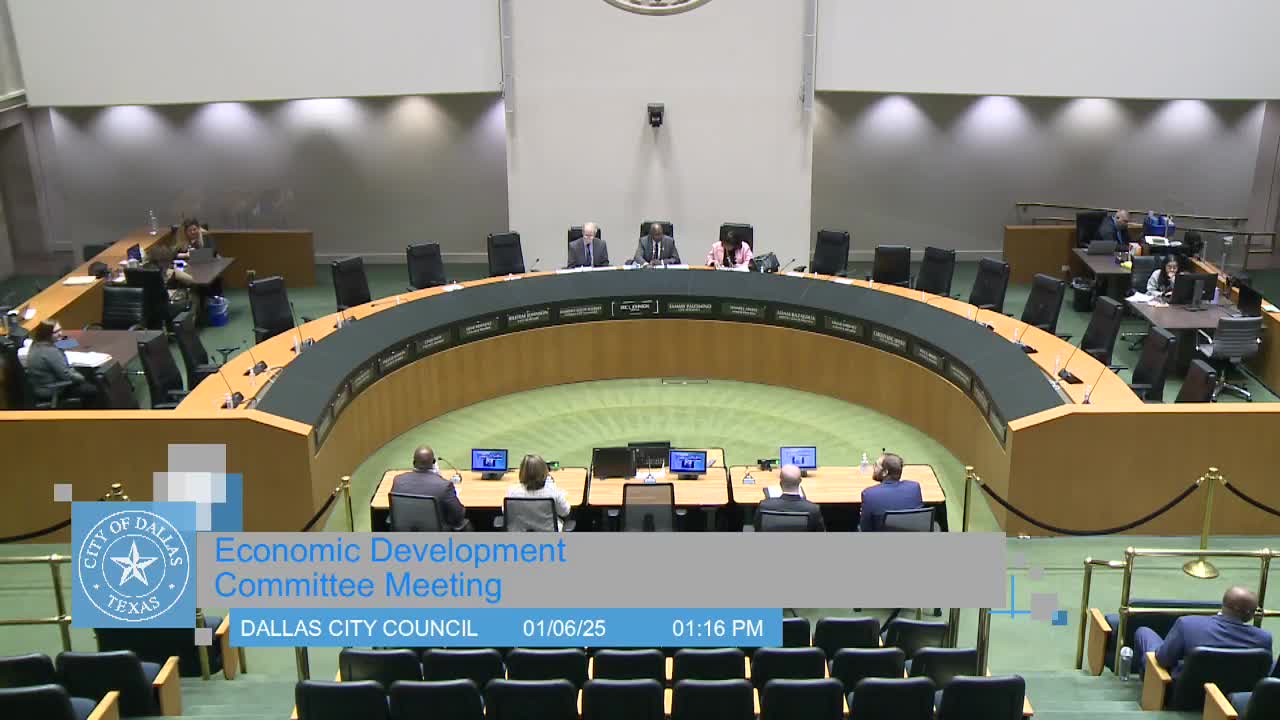Dallas House Opportunity Fund reports 553 affordable units financed, eyes expanded capital and land trust for homeownership
Get AI-powered insights, summaries, and transcripts
Subscribe
Summary
Ben Gillespie, senior director of fund investments for LISC Fund Management, told the Economic Development Committee the Dallas House Opportunity Fund has financed 553 affordable housing units as of December 2024 and is "well on our way" to meeting the program’s 1,500-unit goal.
Ben Gillespie, senior director of fund investments for LISC Fund Management, told the Economic Development Committee the Dallas House Opportunity Fund has financed 553 affordable housing units as of December 2024 and is “well on our way” to meeting the program’s 1,500-unit goal.
“We were ceded with $6,000,000 from the city. We were charged with financing 1,500 affordable units by the year 2031,” Gillespie said. He and other presenters said the fund’s total capital has grown to $41.5 million after four new investors joined last year; the fundraising goal for the vehicle is $46 million, with the fund’s window to reach that goal running through the end of 2026.
The fund’s structure and recent activity
Gillespie said eight deals have closed so far, representing 553 units financed; 239 of those units are completed and leased or occupied. Four additional deals were under underwriting and expected to close by the end of the second quarter, which fund staff said would put about 1,200 units closed or under construction. The fund’s investors include the city, Sunflower Bank, Truist and new participants KeyBank, Charles Schwab and BOK Financial.
Dan McDermott, director of investor relations for LISC Fund Management, explained that banks participate in the fund in several ways — as grants, debt or equity — and that debt investors are paid ahead of equity in the fund’s “waterfall” repayment schedule. “There are several ways for potential CRA banks to participate. They can either do a grant, they can do a loan, like you said, a debt investment in the fund, or they can do equity,” McDermott said.
Gillespie described the fund’s eligibility rules and underwriting: at least half of a development’s units must be affordable at 100% area median income (AMI) or below; some investors require half at 80% AMI or below. The fund supports new construction and preservation/rehab projects, including mixed-income developments in areas the city designates as “high opportunity.” He said five of the eight closed deals are in the city’s high-opportunity zones; two closed deals are below I-30.
Target populations, partners and pipeline
Presenters highlighted the fund’s attention to developer diversity and supportive services: more than 84% of participating developers on closed deals were women-led or Black-led firms, the fund includes at least one supportive housing project (Metro Care) and projects feature wrap-around services such as child care centers and workforce supports. The presentation named Park Lane Terrace, a 150-unit project targeted to resettle refugees vetted by the U.S. Office of Refugee Resettlement, as the most recent closing.
Gillespie said the fund is currently about 90% of the way to its $46 million goal and has a pipeline he described as “over 200,000 units” in opportunity — language the presenters used to indicate many projects are seeking capital if more funding is available.
Homeownership and community land trust discussion
Committee members pressed staff about using fund or other city dollars to support homeownership and deeper affordability. Gillespie said the fund’s current requirement for 15-year affordability on financed projects has discouraged some for-sale developers and that a shorter affordability term (5–10 years) could enable more single-family, owner‑occupied projects.
Councilmember Sherman Ridley and others asked whether a land trust could preserve affordability for for-sale units while shortening deed restrictions. Ben Gillespie and Jamie Jolley of the Real Estate Council said they were coordinating with city staff to stand up a Dallas Community Land Trust. Thorickson (assistant director, Department of Housing and Community Development) said the Real Estate Council and partners intend to apply for municipal designation and that staff expects to receive a proposal for the land trust in the coming months. “They intend to apply to us for municipal designation in February and March,” Thorickson said.
Bank participation and next steps
Councilmembers asked whether major depository banks — specifically Bank of America and JPMorgan Chase — had been approached. Speakers said Bank of America had been approached but conversations had not yet advanced; LISC said it was finalizing an agreement with JPMorgan Chase and had extended its contract with Bank of America as part of a transition. Gillespie said the fund will recycle loan repayments to finance future deals and that without additional investment it will still meet the current fundraising target but will be “out of money” again after the current pipeline closes.
Why this matters
Committee members framed the fund as a leveraging tool that uses $6 million in city seed capital to attract private capital that can produce affordable units in areas of opportunity and to support diverse developers and services for residents. Members discussed whether the city should consider additional contributions or reallocate other housing trust or bond funds to scale the program beyond the current 1,500-unit target.
Looking forward, presenters said they expect to close four underwriting deals by the second quarter and continue fundraising to expand the fund’s reach.
